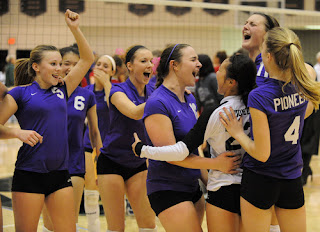I had the opportunity recently to attend a seminar
given by leadership guru John C. Maxwell. Maxwell has written dozens of
best selling books on the subject of leadership, so do take the time to
pick up his work and read this article carefully!
Make no mistake, leadership skills are vital for your athlete to
cultivate and possess if they have a goal of playing at the next level.
Travel, high school and college coaches alike always put athletes with
strong leadership skills at the
top of their list. Like
everything else...leadership is a choice your athlete can and should
make at whatever level he or she is capable of.
Here are 8 leadership tips to move your athlete to the top:
1. Leaders expect more from themselves and others. They never
limit themselves or allow others to limit their success, their
enthusiasm, their effort or attitude. They are always inspired to grow
as people and athletes and expect the same from teammates. Leaders see
more for their team and teammates and are relentless in their pursuit of
success. As a personal friend told me about his former teammate
Michael Jordan, Jordan was always working amazingly hard to improve his
teammates in every area of their game, during practice and games.
2. Leaders take the time to build relationships. They converse
with teammates and coaches alike to build report and respect. Leaders
are interested in their teammates thoughts, feelings and motivations.
They understand the value of team chemistry and are the driving force to
that end on their team. Leaders are charismatic individuals others take
notice of.
3. Leaders are big picture thinkers. They recognize the
game is a process that takes time to master. Leaders help their
teammates to understand this truth and thus teammates look to the leader
for support and direction in the most difficult game situations.
Leaders play the game one play at a time, yet know exactly when to
lead.
 |
| Drew Brees |
4. Leaders are always observing. They are, not only, watching the
game for ways to personally get better...but they are constantly aware
of their teammates moods and performances, looking for opportunities to
help their teammates and ultimately their team to succeed. Leaders
listen and learn...always!
5. Leaders lead by example. They recognize that their teammates and coaches (and scouts) are watching their every move and, as such, they
walk the talk.
They have a stellar work ethic, they honor the game, they are aware of
their body language and verbal language to keep their teammates on
purpose. They are a solid and dependable role model for their team.
6. Leaders are highly respected. They earn this respect because
they put into practice all the tips listed here. Respect allows leaders
to influence their teammates. Their personal attitude and expectations
for the
team's attitude are embraced by teammates. In this way leaders can motivate their teammates to be better.
7. Leaders create buy in from teammates and coaches. They
can effectuate both subtle and dramatic changes on their team because
those around them buy in to them as a leader first. Once their teammates
and coaches buy into their leadership stature their vision (or
recommendations) for the team are easily followed. For example if a
leader sees certain players or the team's effort or energy is down he or she
can set the tone for improvement in these areas easily because their
teammates respect them and what they say.
8. Leaders find a way to win. They have the power to lead their
team to victory regardless of the circumstances or hurdles encountered
along the way. Think Michael Jordan; think Joe Montana; think Drew
Brees. Their teammates are inspired and motivated by their leadership
skills and give more and do more than they thought they could do.
Leaders raise the collective level of performance by their team by
design.
If you or your athlete have not discussed their leadership role on his or her
team you should. Leaders are highly
coveted by top coaches at every level.
Remember, being a leader does not mean an athlete must be the best
player or have the best statistics. Sports are filled with some
very unlikely leaders, but leaders who can get the most from their
teammates while playing a vital role in their team's success. Leaders
also do not need to be loud. Some of the world's greatest leaders over
time have been extremely quiet (think The Dali Lama, Phil Jackson, Tony
LaRussa, Derek Jeter).
Leaders are not
born, they are
made through a combination
of hard work (mastering both physical and mental skills) and a
recognition of the opportunity leadership may provide for them and their
team.
For more on leadership do read the many excellent books written by John Maxwell.







